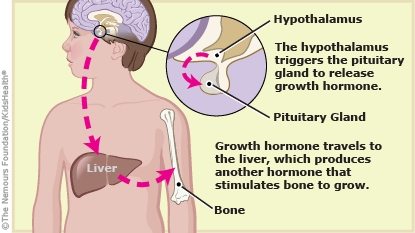Growth Hormone Deficiency: How to Care for Your Child
Growth hormone deficiency means someone's pituitary gland (a part of the brain) doesn't release enough growth hormone. Kids with the condition are shorter than other kids their age. They may have other problems too. If treatment with growth hormone injections is started early, many kids with growth hormone deficiency can grow to a normal height. Follow these instructions to care for your child.


-
Follow your health care provider's recommendations for:
-
taking your child for any testing
-
seeing any specialists such as an endocrinologist (hormone doctor)
-
giving your child any medicines
-
when to follow up to check your child's growth again
-
If your child is starting growth hormone therapy, talk to your health care provider about possible side effects.
-
If your child is upset about being small, let them talk about their concerns. Focus on their strengths and talents rather than height. It also can help to:
-
Encourage them to develop hobbies that they enjoy, such as playing games, photography, or playing an instrument.
-
Help them find a sport or activity that works for them. They may enjoy dance, running, or wrestling, for example.
-
Suggest that they talk to a counselor.
-
Don't tease your child about being small, and don't let others do it either.

Your child gets new symptoms such as headaches, hip pain or knee pain, enlarged breasts, or a limp. These can be side effects from treatment with growth hormone.

What happens in growth hormone deficiency? Normally, the hypothalamus (a part of the brain just above the pituitary gland) sends messages to the pituitary gland, triggering it to release growth hormone into the blood. Growth hormone then signals the liver to release another hormone that causes bones to grow. In growth hormone deficiency, the pituitary gland doesn't make or release enough growth hormone, so the bones don't grow normally.
What causes growth hormone deficiency? Someone can be:
-
born with it because of a gene change (mutation)
-
develop it from a head injury, brain tumor, brain radiation therapy, or other illnesses
-
have it for unclear reasons (called idiopathic growth hormone deficiency)
What other problems can happen if growth hormone deficiency isn't treated? Besides poor growth, people with untreated growth hormone deficiency may have low bone mineral density (weak bones), a higher risk of heart disease, and low energy.